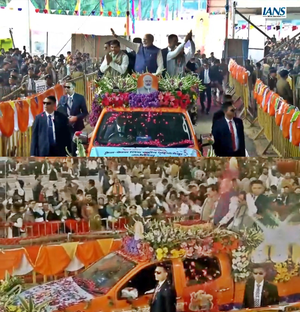
Khajuraho: On December 25, Prime Minister Narendra Modi arrived in Khajuraho, Madhya Pradesh, to initiate the Ken-Betwa river linking project, coinciding with the 100th birth anniversary of former PM Atal Bihari Vajpayee. During his visit, he paid floral tributes to Vajpayee at an event where several development projects were launched.
Chief Minister Mohan Yadav and BJP state president V.D. Sharma greeted PM Modi at Khan airport. He then traveled to the event venue in an open vehicle, where he received a warm welcome from a large crowd that gathered to cheer, wave flags, and shower flowers. Accompanying him in the decorated vehicle was CM Yadav.
Upon arrival, PM Modi reviewed an exhibition related to the Ken-Betwa project, where a senior MP government official briefed him about its details. Many individuals from across Bundelkhand came to celebrate this significant occasion, showering the PM with flowers and chants.
Prior to Modi’s arrival, the Madhya Pradesh BJP organized a Kalash Yatra from Katni to Khajuraho. The event venue was beautifully decorated for the ‘bhoomi pujan’ ceremony of the Ken-Betwa river link project, which has a budget of ₹49,000 crore. This initiative marks India’s first river-linking effort under the national river interlinking policy, aimed at alleviating drought and migration concerns in the Bundelkhand region of Madhya Pradesh and Uttar Pradesh.
The project is anticipated to provide irrigation benefits covering over 8.11 lakh hectares in Madhya Pradesh and 59,000 hectares in Uttar Pradesh, positively affecting around seven lakh farmers and stabilizing existing irrigation. It will also supply drinking water to 44 lakh residents in Madhya Pradesh and 21 lakh in Uttar Pradesh, while generating 103 MW of hydropower and 27 MW from solar energy. Additionally, it plans to restore 42 heritage ponds from the Chandela era to enhance groundwater levels.
The Ken-Betwa project, the largest irrigation scheme in India, will employ an underground pressurized pipe irrigation system. Central to the project is the construction of the 77-meter-high Daudhan Dam on the Ken River, located within the Panna Tiger Reserve, which will channel surplus water to the Betwa River via a 221-km canal.
This initiative aims to enhance forest ecosystems and reduce flooding issues in Banda district, Uttar Pradesh. Moreover, the Daudhan reservoir will ensure a year-round water supply for wildlife in the Panna Tiger Reserve, thereby improving the ecosystem and providing relief from flooding in Banda.
